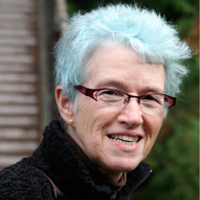Rosie Redfield | |
|---|---|
 | |
| Born | Rosemary Jeanne Redfield |
| Alma mater | Monash University (BSc) McMaster University (MSc) Stanford University (PhD) |
| Awards | Nature's 10 (2011) [1] |
| Scientific career | |
| Fields | Microbiology Genetics DNA Evolution [2] |
| Institutions | University of British Columbia Harvard University Johns Hopkins School of Medicine |
| Thesis | Generation of cryptic lambda prophages in Escherichia coli K-12 (1987) |
| Doctoral advisor | Allan M. Campbell |
| Website | rrresearch |
Rosemary Jeanne Redfield is a microbiologist associated with the University of British Columbia [2] where she worked as a faculty member in the Department of Zoology from 1993 until retiring in 2021. [3] [4]